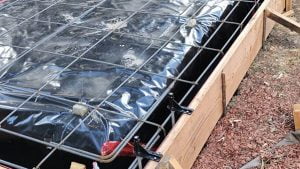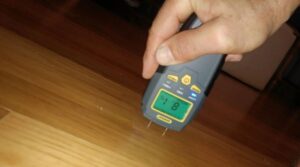Disclosure: We may earn commissions at no cost to you from qualifying purchases made via the product links in this article.
One of the biggest problems with electrical connections is corrosion. It occurs when the metallic parts of an electrical contact react with the surrounding air or moisture to form an oxide chemical compound.
This chemical compound is a poor conductor of electricity. So, when it forms around the electrical contacts, it decreases their electrical conductivity. This results in a voltage drop around the corroded terminals and overall poor and inefficient performance of the powered components.
For example, when the terminals of a car battery corrode, the battery starts to discharge even when it is not in use. Hard starts also become very common because there is hardly enough current in the battery for the starter motor.
To overcome this problem, people often resort to applying various types of sealants including automotive grease and petroleum jelly onto the electrical terminals. These sealants protect electrical contacts from corrosion by repelling water and blocking air. Unfortunately, they are not as effective as dielectric grease.
What is dielectric grease?

Dielectric grease is a waterproof silicone compound for sealing electrical contacts and terminals from salt, water, air, and dirt. It does not conduct electricity and has excellent sealing properties for a wide temperature range.
In other words, dielectric grease or silicone grease does not liquefy or melt at high temperatures like petroleum-based sealants. It is also very safe on plastic and rubber, unlike many other sealants.
What is dielectric grease used for?
Dielectric or Silicone grease has many uses across a wide range of industries including off-grid solar, automotive, electrical, and marine. It is also very useful for general-purpose use.
Solar Off-grid power systems
You can use it in solar off-grid power systems to seal electrical connections and terminals of deep cycle batteries to prevent galvanic corrosion. As I mentioned, corroded battery terminals cause voltage leaks that affect the overall performance of the system. That is why it is important to keep the terminals clean, snug, and free of corrosion.
So, after performing the regular maintenance on your battery bank, i.e testing batteries, adding water, and cleaning the terminals, make sure you dab some dielectric grease on the terminals. The grease will repel water and create an air-tight seal on the terminals to inhibit corrosion ad oxidation. This is a common practice in the Northeast states where humidity levels are high and metals corrode easily.
Automotive applications of dielectric grease
Use as sealant for battery terminals
Silicon grease is very common in the automotive industry. It acts as a good sealant for car battery terminals. You can apply a thin coat on the battery posts after a good deep scrub with wire brush to prevent corrosion.
Unlike vaseline or any other petroleum-based grease, silicone grease does not melt or harden in extreme temperatures. So it is the best grease for protecting car battery terminals.
Use as grease for O-ring and rubber bushings
Silicone paste is also excellent for greasing O-rings and rubber bushings because it does not damage them. You can apply a bead of the grease around pump O-rings or suspension bushings to create an air-tight seal and keep out dirt.
Use as tune-up grease for spark plugs
If you live in an area where there is a lot of corrosion such as in the humid Northeast states, you can use dielectric grease as tune-up grease for sealing spark plug wire boots. It prevents corrosion, arcing around the boot to the engine block, and makes it easy to pull out the spark plug wire.

To grease the spark plug boot effectively, just apply a coat on the inside of the boot. Avoid covering the terminal with grease because it can prevent the spark from traveling to the sparkplug, resulting in a misfire.
You can also dab the paste around the porcelain part of the spark plug to ensure a tight seal.
Use as sealant for electrical connectors
Lastly, silicone grease acts as a good sealant for sensitive electrical components. When you dab a little of it around electrical connectors you can keep moisture and water out. The paste is also good for protecting the electrical connections of automotive sensors. Needless to say, you can use it to eliminate squeaks and squeals on moving parts.
Electrical applications of dielectric grease
A common application of dielectric grease is circuit breakers in electrical distribution equipment. If you are a technician of an electrical grid, this is a topic you are obviously familiar with.
Dielectric grease lubricates the moving parts inside a circuit breaker, prevents corrosion, and blocks contaminants. In fact, a major cause of circuit breaker failure is the lack of sufficient lubrication of the electromechanical components.
Dielectric grease also acts as bulb grease. You can use it to cover around the bulb socket especially for outdoor bulbs to seal out air and water.
Marine applications of silicone grease
Di-electric grease is a must-have in the marine industry. It is good for protecting all electrical connections, from marine battery terminals to electrical connectors and other marine installations. The grease seals out water and air and other contaminants to prevent corrosion and oxidation on the sealed parts. It also keeps out salty water from accidentally shorting battery terminals. You can use it to protect bolted electrical connections, crimped quick-connects, and light-bulb sockets on recreational boats and yachts.
To use it, simply apply a coat on the contact surfaces before clamping them together. The clamping pressure will push the grease out of the way to create a good electrical connection and an excellent seal around the contacts. The only place you cannot use the grease is on electronic and antenna connections. This is because of the fact that silicone paste can gather dust inside an electronic device and that the grease loses its dielectric property at radiofrequency.
However, you can dab the grease on threads of antenna mounts to keep them from seizing. You can also use it on antenna O-rings and rubbers seals to keep out water and salt contaminations.
Properties to look for when choosing the best dielectric grease
When picking silicon grease for your project, there are specific properties you should look for. I have summarized them below.
Viscosity
This is the measure of a fluid’s resistance to flow. A good dielectric grease should have a high viscosity. To be precise, the grease should be paste-like so that it doesn’t migrate from the areas of application.
Curing
Curing is the ability of a substance to change to a more stable form, typically hardening and becoming tougher. Silicon grease should be non-curing. In other words, it should remain in its paste form throughout.
Temperature tolerance
Temperature tolerance of grease refers to its operating temperatures. Good dielectric grease is tolerant to heat over a wide range of temperatures. This keeps it from melting under high temperatures.
The high-temperature tolerance of silicon grease is one of the reasons it is perfect for use in high heat environments such as under the hood on automotive wiring connectors and spark plug boots. Most dielectric greases offer a tolerance of between -50 deg C and 200 deg C, which is good enough.
Voltage range
Silicon paste is a non-conductor that has a maximum voltage limit for which it cannot conduct. A good paste should be dielectric at least for up to 1000 volts.
Weight
The weight of dielectric grease determines if the grease will provide the right film strength and yet be light enough to flow well in cold temperatures.
Well. those are some of the most important properties to look for when choosing dielectric grease for your project. An additional factor to consider, of course, is whether the grease is petroleum-based or silicon-based. Although dielectric grease primarily refers to silicon grease, don’t be surprised when some people use the term to refer to other types of greases. So, when shopping for dielectric grease, it is good to specify that you want silicon grease.
Silicon grease has many advantages over other types of grease. Being a synthetic compound, it has a wider range of operating temperatures, repels water, provides better electrical insulation, and of course, lasts longer than petroleum greases.
Frequently Asked Questions About Dielectric Grease
What is the difference between regular silicone and dielectric grease?
Regular silicon is curing but silicon dielectric grease is not. In other words, regular silicon sealant hardens over time but silicon grease remains a paste forever.
Is Vaseline a dielectric grease?
No. Vaseline is not a dielectric grease but is it a good temporary substitute. The reason why you should not use it for long is that it melts at high temperatures and releases a flammable vapor since it is petroleum-based. In contrast, dielectric grease is a product of silicon and does liquefy or produce a flammable substance when you expose it to heat.
Is dielectric grease conductive?
No, dielectric grease does not conduct electricity hence the name. In fact, it has excellent electrical insulation properties for a wide temperature range.
Can I use dielectric grease as bulb grease?
Yes. Silicon grease works very well as bulb grease because it is waterproof and therefore seals out air, moisture, water, and contaminants from the contacts.









